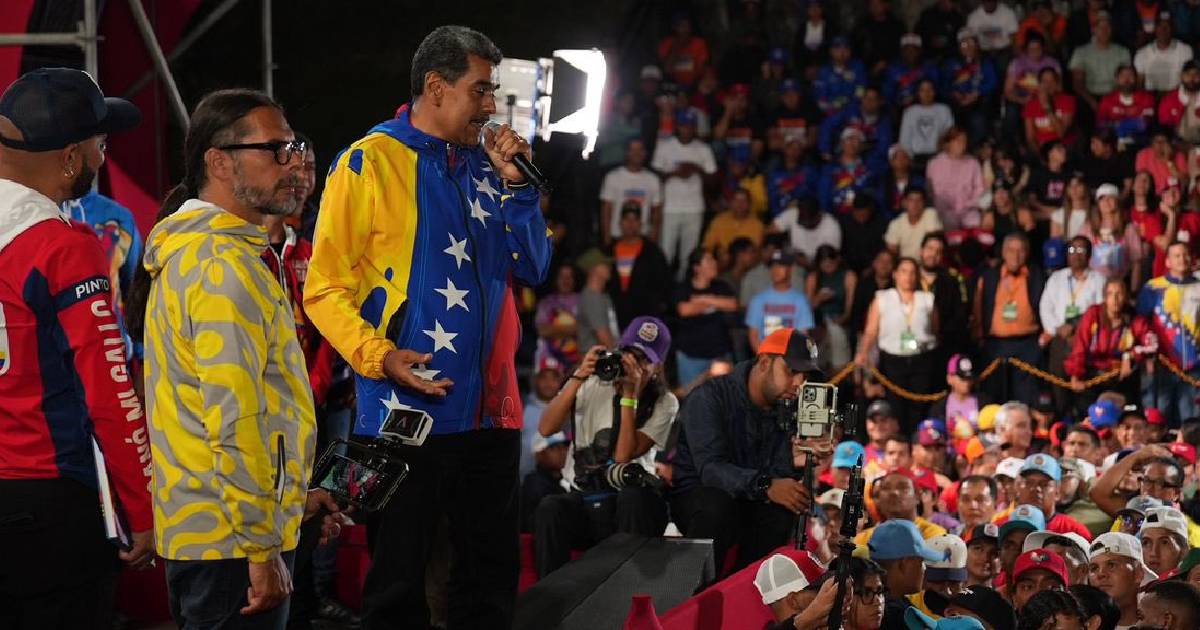The controversial re-election of Venezuelan leader Nicolás Maduro continues to generate significant reactions within the international community. Many countries have either refused to recognize the results or have expressed caution in their responses to the pronouncement by the nation's Electoral Council.
Global Leaders Demand Electoral Transparency
On Monday, July 29, 2024, the electoral authority, dominated by supporters of chavismo, announced Maduro's re-election, a result that immediately sparked protests and rejection from the opposition and a significant portion of the population.
One of the first to respond was Chilean President Gabriel Boric, who stated on social media platform X that "the Maduro regime must understand that the results it publishes are hard to believe." He added, "The international community and especially the Venezuelan people, including millions in exile, demand total transparency of the records and the process, and that international observers not allied with the government verify the results."
From Uruguay, President Luis Lacalle Pou pointed out irregularities in the election process and vote counting, declaring that "the process was clearly flawed" and "a victory cannot be recognized if there is no trust in the methods used."
Colombian Foreign Minister Luis Gilberto Murillo called for a "complete vote count, verification, and independent auditing." He emphasized the importance of ensuring electoral transparency and guarantees for all sectors, urging international observers to present their conclusions on the process.
In a statement from Tokyo, U.S. Secretary of State Antony Blinken expressed "serious concerns that the announced result does not reflect the will or votes of the Venezuelan people." Blinken stressed the need for every vote to be counted fairly and transparently, and for electoral officials to immediately share information with the opposition and independent observers.
Costa Rican President Rodrigo Chaves condemned the elections as "fraudulent" and stated that his government "categorically repudiates the proclamation of Nicolás Maduro as President of the Bolivarian Republic of Venezuela." He added, "We will work with democratic governments across the continent and international organizations to ensure the sacred will of the Venezuelan people is respected."
In contrast, Mexican President Andrés Manuel López Obrador took a more cautious stance, advising patience until the final results are known. "We will wait for the votes to be fully counted. Our information indicates that the Venezuelan electoral body is declaring President Maduro the winner, and that is what we know," he said.
From Panama, President José Raúl Mulino announced the suspension of diplomatic relations with Venezuela and the withdrawal of Panamanian personnel from the country.
The European Union also weighed in, with its High Representative for Foreign Affairs and Security Policy, Josep Borrell, stating that "the Venezuelan people voted peacefully and massively on the future of their country. Their will must be respected." He emphasized the importance of ensuring electoral transparency, including detailed vote counting and access to voting records.
Support for Maduro's Claimed Victory
However, not all reactions have been critical. Maduro received congratulations from allies including Cuba, Bolivia, Nicaragua, and Honduras, as well as from Russia, China, Qatar, and Iran.
Cuban leader Miguel Díaz-Canel congratulated Maduro on X, hailing the "historic electoral victory" as a testament to the Venezuelan people's will. Meanwhile, Honduran President Xiomara Castro de Zelaya extended her "Democratic, Socialist, and Revolutionary congratulations to President Nicolás Maduro and the brave people of Venezuela for their incontrovertible triumph, reaffirming their sovereignty and the legacy of Commander Hugo Chávez."
Russian President Vladimir Putin highlighted the "strategic partnership" between Russia and Venezuela, expressing confidence in Maduro's continued contribution to its development. "You are always welcome on Russian soil," Putin said, according to the country's Foreign Ministry.
Chinese Foreign Ministry spokesperson Lin Jian also expressed willingness to deepen the strategic partnership between China and Venezuela, benefiting the peoples of both nations, as reported by AFP.
Frequently Asked Questions about Venezuela's Election Controversy
The recent re-election of Nicolás Maduro in Venezuela has raised numerous questions and concerns internationally. Here are some frequently asked questions that shed light on the situation:
Why is the international community questioning the election results in Venezuela?
Many countries and international observers believe that the election process lacked transparency and was marred by irregularities, leading to doubts about the legitimacy of the results.
What actions are countries taking in response to the disputed election?
Some countries are refusing to recognize the results, calling for independent audits, and even suspending diplomatic relations with Venezuela. Others are demanding a full and transparent recount of the votes.
Which countries have expressed support for Nicolás Maduro?
Countries such as Cuba, Bolivia, Nicaragua, Honduras, Russia, China, Qatar, and Iran have congratulated Maduro on his re-election, reaffirming their political support.
